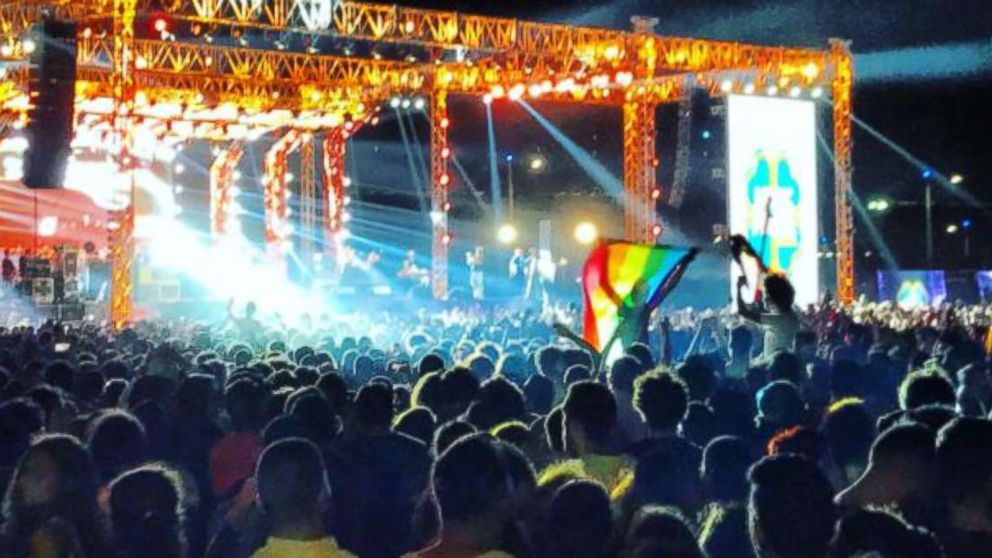Amid Egypt's LGBT crackdown, rights worker asks, 'Where is the crime in waving a flag at a concert?'
— -- The latest crackdown against Egypt's LGBT community started with a couple of rainbow flags at a concert and ended with the arrest of more than 50 people, according to human rights groups.
Attendees at a rock concert in Cairo last month raised rainbow LGBT pride flags in the air, and soon after, Egyptian authorities rounded up dozens of men — some of whom they found on gay dating apps, according to rights groups — and charged them with engaging in or promoting "debauchery." Mashrou’ Leila, a popular Beirut-based band, was playing for a crowd of thousands of people at the Sept. 22 concert that set off the firestorm and has led to dozens of arrests. Since then, the band's openly gay lead singer told ABC News the arrests have "completely consumed" the group.
The police arrested 59 people in all, including at least one woman and one minor, according to the Egyptian Initiative for Personal Rights, a leading local rights group. All were charged with engaging in or promoting “debauchery,” and two of the people who police said were holding a pride flag faced the additional charge of belonging to a banned group, according to EIPR. International rights groups have condemned the detentions, and EIPR said that as of Monday, all of those arrested remained in police custody.
In a conservative, Muslim country where persecution against LGBT people is not uncommon, the latest wave of arrests stands out both because of the number of people who were detained and the ongoing ripples of fear the arrests caused in Egypt's LGBT community.
"I was terrified when I got the news,” a gay man from Cairo in his late 30s, who is currently out of the country and requested anonymity, told ABC News. “It seriously made me feel blocked, absolutely unable to understand what ‘home’ means anymore when one could be thrown into prison on the basis of being homosexual.”
The man, who requested anonymity for fear of arrest and societal retribution, said he is trying to delay his return to Egypt. Several gay Egyptians declined requests to be interviewed, afraid they, too, would be detained; some have deleted the gay dating app Grindr from their cellphones.
“It feels very different — it feels that a decision is being made that will shape the lives of many people for decades to come,” the man said. “Cairo was never easy, but now, personally, I feel very threatened.”
'A piece of cloth that stands for love'
Over the past four years, 232 people have been arrested as part of the Egyptian government's crackdown on LGBT people, according to the EIPR. The arrests often coincide with anti-gay media coverage, the group said.
Hamed Sinno, Mashrou’ Leila’s lead singer, said he did not realize what was to come when flags went up amid the crowd at last month’s show.
“We saw a couple of flags in the audience,” Sinno told ABC News. “We did see them. It was quite heartwarming, to be honest, to see that kind of stuff go up and to not see any fights or any violence happen at the show.”
Images of the flags went viral on social media soon after, though, and Egyptian state and private media outlets unleashed an aggressive campaign against the concertgoers, often referring to them using a derogatory term meaning “deviant.”

One popular television anchor, Ahmed Mousa, called on the parliament to lengthen the punishment for what he called "crimes" to a life sentence, arguing they were as dangerous as terrorism.
Homosexuality is not criminalized in Egypt, but authorities often arrest LGBT people under laws against “debauchery” and prostitution.
A coalition of pro-LGBT groups across the Middle East released a statement last week calling on media outlets to refrain from publishing hate speech, which it said had spurred the latest crackdown.
Even after the media backlash, Sinno said, the band members “were all naively optimistic” that the reporting might have been incorrect and that the government was just trying to appease those who had been outraged by the flag photos.
But as news of the arrests spread, the band — after first remaining silent, on activists’ advice — issued a statement calling for an international campaign against the Egyptian government. The members are spending the fall in New York as artists-in-residence at New York University's Hagop Kevorkian Center for Near Eastern Studies, where they are leading a workshop.
“We denounce the demonization and prosecution of victimless acts between consenting adults,” the band wrote in the statement. “It is sickening to think that all this hysteria has been generated over a couple of kids raising a piece of cloth that stands for love.”
Sinno said the band planned to proceed as usual — it has faced threats before, such as in Jordan — but was disheartened by the lack of international condemnation of Egyptian authorities, particularly from Western countries that provide aid to Egypt.
“If we had known that anything like that sort of thing was going to happen, we probably wouldn’t have played the concert,” Sinno said, although he added that he thought the arrests may have happened anyway. “The idea that this has anything to do with five bodies on stage making sound is a little absurd if you think about it.”
'It's just one group after another' facing repression
While Egyptian security services have carried out occasional crackdowns against LGBT people before, repression has intensified under Egypt’s military leaders in recent years, analysts said.
While it was unclear if the arrests were pre-planned to draw attention away from Egypt’s weak economy or unrelated political developments, they do follow a clear pattern, according to Michael Hanna, a senior fellow at The Century Foundation.
“It’s not necessarily any broader effort at diversion,” Hanna told ABC News. “This is the way that the government responds. It’s much more elemental than that.”
Egyptian authorities have in recent years arrested not just LGBT people but Islamists, secular activists, human rights workers, and journalists, among others.
“It’s just one group after another,” Michele Dunne, a senior fellow and director of the Middle East Program at the Carnegie Endowment for International Peace, told ABC News. “The number of people in detention for political or civic activism of one kind or another is in the tens of thousands.”
State Department Spokeswoman Heather Nauert said in a statement that the United States was “concerned by reports of detentions and arrests of LGBTI persons” in Egypt. She said the United States urged countries “to uphold and respect their international human rights obligations and commitments” but did not call for any actions by Egypt specifically.
Periodic crackdowns
The LGBT community in Egypt has been subject to period crackdowns from authorities. In 2001, police rounded up 52 men on a floating nightclub moored on the Nile in Cairo, according to the Associated Press.
More recently, in 2014, eight men were sentenced to prison for appearing in a video that allegedly showed a gay marriage, and 26 men were detained at a Cairo bathhouse as a television crew filmed the raid, according to AP. The 26 men were later acquitted.
Once detained, those rounded up face abuses by police, human rights groups said.
“From testimonies collected in the past, we know that beating, cursing, and limiting visits is a systematic practice by the police,” Dalia Abdel-Hameed, the head of the gender program at the Egyptian Initiative for Personal Rights, told ABC News. “The worst treatment takes place in police stations, which sometimes include physical harassment, groping and threatening with sexual violence.”
Authorities sometimes carry out invasive anal examinations, and at least five people arrested after last month’s concert were subjected to the procedure, according to Amnesty International, which the group called “tantamount to torture.”
Sometimes people who have previously visited detainees are arrested themselves, according to Abdel-Hameed. Other times, people whose names appear on lists of sexual partners detainees are forced to share with police are then rounded up, she said.
As of Monday, 10 of the people arrested in the latest crackdown have been sentenced to prison terms ranging from two to six years and are awaiting appeal, she said. Two had been acquitted but remained in custody, she said.
“It is needless to say that the majority of those arrested have nothing to do with the concert, but the government's interest in a flag being waved raises a lot of questions on the priorities of this government,” Abdel-Hameed said. “Where is the crime in waving a flag at a concert?”
“Whatever the government reasons are, the price those people are paying is a hefty one, the torture and the stigma they have to deal with," she added.
Mashou’ Leila said it had been banned from playing in Egypt in the future. Since the Sept. 22 concert, Sinno said he had heard from “frightened” and “embarrassed” fans there.
“Change doesn’t come easily,” Sinno said, asked if he had a message for those fans. “I hope this doesn’t disillusion people enough to think that change is impossible.”




